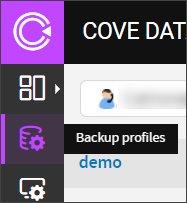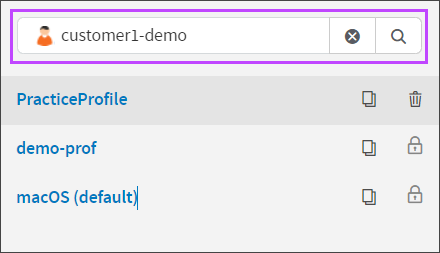Cove Data Protection (Cove)'s Backup Profiles let system administrators configure backup settings for multiple devices as one.
Profiles are available to the following types of customers: distributors, sub-distributors, resellers, end-customers and sites.
Profiles are supported for Windows, macOS and Linux backup devices
Profiles, while similar to Retention Policies and Products, do differ in a number of ways.
A Retention Policies is applied to a device automatically, unless a previously created custom Product was applied. Profiles are optional.
It is no longer possible to create new custom Products, as this feature has been replaced by Retention Policies. Existing custom Products can still be used, but we would highly recommend switching to Retention Policies at your earliest convenience.
Permissions configured through the backup profiles work in conjunction with retention policies or product permissions.
Default Profiles
Two default profiles are available for use:
- 1 hour RPO - To configure hourly backups
- 24 hour RPO - To configure daily backups
Custom Profiles can be created by following the steps on Add Custom Backup Profiles
Limitations
- Profiles cannot be moved to different customers
- Profiles can only be used for the customer it was created for, or child customers of this
i.e. a Profile created at Reseller1 can be used on devices for this customer or any end-customers or sites of this customer, but cannot be used at the distributor or sub-distributor level, or on Reseller2.
- Pre- and post-backup scripts are not compatible with backup profiles
Once a profile is assigned to a device, the Scripts tab under Backup Manager Preferences will not be displayed.
- When a profile is assigned to a device, the Performance tab of the Backup Manager GUI will no longer display the Abort backups and do not start backups when limited time frame is reached for these backup data sources option
LocalSpeedVault settings in backup Profiles
To prevent data loss caused by the profile applying the incorrect LocalSpeedVault credentials when not fully synchronized, LocalSpeedVault settings can no longer be applied in a profile.
The profile must be disabled before configuration of the LocalSpeedVault can be applied.
- Disable device profile
- In Management Console, select device checkbox in the dashboard > Assign Profile > Choose no profile
- Restart Backup Service Controller on affected device to apply the changes
- Launch the Backup Manager and change the LocalSpeedVault details to the correct location and save
- Re-apply the profile
- In Management Console, select the device checkbox in the dashboard > Assign Profile > Choose the profile you removed in step 1
Alternatively, wait 15 minutes and the changes will be applied automatically
Once the LocalSpeedVault is fully synchronized, further changes can be made from the profile
Find a Profile ID and Version
Backup Profile IDs are generated automatically when the automatic deployment is enabled.




